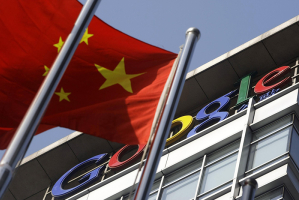
After several attempts to block Google's Gmail service in its country, it looks as though the Chinese government has finally blocked all access to the popular email provider through every possible route, including third-party email clients.
The blockage of Google websites and services began in 2011, but Friday marked the first time the block had reached to third-party apps that would still allow Gmail access through IMAP, SMTP, or POP3. Google revealed data numbers that showed Gmail traffic dropping down to zero from Chinese servers this weekend, essentially cutting off all email communication on the world's most popular web-based email provider.
The NY Times points out just how detrimental this can be, not only to Chinese citizens and their personal email, but also Chinese business. "The new step in blocking Gmail has consequences that go well beyond making it difficult for users to access personal emails. Some foreign companies use Gmail as their corporate email service, for example."
"They shouldn't have blocked Google or Gmail; it's against the spirit of the Internet," said Yuan Shengang, the chief executive of Beijing-based cybersecurity company Netentsec.
"I think the government is just trying to further eliminate Google's presence in China and even weaken its market overseas," a member of China-based freedom of speech advocacy group GreatFire.org added.
But China is denying the block, stating that the country welcomes transparency. "China has consistently had a welcoming and supportive attitude towards foreign investors doing legitimate business here," said Chinese Foreign Ministry spokeswoman Hua Chunying. "We will, as always, provide an open, transparent and good environment for foreign companies in China."
According to China's policy of internet censorship, often referred to as The Great Firewall of China, more than 2,700 websites are currently blocked from access to and from mainland China, including Facebook, YouTube, Twitter, Blogspot, and more. This ban does now affect regions like Hong Kong or Macau where Chinese laws don't apply.
The official name of the Great Firewall is the Golden Shield Project. It was created in 1998 and began operating in 2003 by the Ministry of Public Security division of the government of China. Initially, its purpose was to help funnel and regulate unwanted idealogies from the country's new socialist market economy in the 90s.
As written in Articles 4-6 of China's regulation guide on public security, "Individuals are prohibited from using the Internet to: harm national security; disclose state secrets; or injure the interests of the state or society. Users are prohibited from using the Internet to create, replicate, retrieve, or transmit information that incites resistance to the PRC Constitution, laws, or administrative regulations; promotes the overthrow of the government or socialist system; undermines national unification; distorts the truth, spreads rumors, or destroys social order; or provides sexually suggestive material or encourages gambling, violence, or murder. Users are prohibited from engaging in activities that harm the security of computer information networks and from using networks or changing network resources without prior approval."
But the Great Firewall isn't completely impenetrable as tech experts suggest using a Virtual Private Network (VPN) to circumnavigate the blocked IPs.
"It's becoming harder and harder to connect and do work in China when services like Gmail are being blocked," said Zach Smith, a Beijing-based digital products manager at City Weekend magazine. "Using a VPN seems to be the only answer to doing anything these days online in China."







